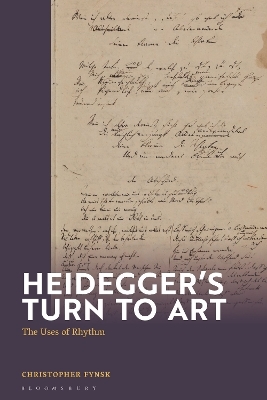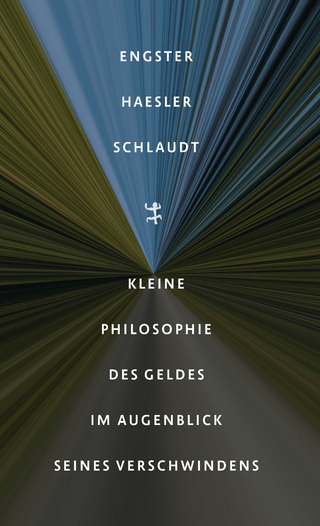
Heidegger's Turn To Art
The Uses of Rhythm
Seiten
2024
Bloomsbury Academic (Verlag)
978-1-350-41003-9 (ISBN)
Bloomsbury Academic (Verlag)
978-1-350-41003-9 (ISBN)
- Noch nicht erschienen (ca. Dezember 2024)
- Versandkostenfrei innerhalb Deutschlands
- Auch auf Rechnung
- Verfügbarkeit in der Filiale vor Ort prüfen
- Artikel merken
In this major new contribution to Heidegger studies, Christopher Fynsk provides an original account of Heidegger’s reflections on art, and in particular the poetic work of art, to explore the central yet overlooked Heideggerian idea that all art has a rhythmic character.
Following the development of Heidegger’s thoughts on rhythm, this book focuses especially on the critical moment of Heidegger’s turn to art in the mid-1930s and his reading of Friedrich Hölderlin’s river hymns. This not only allows for a new reading of his monumental essay “The Origin of the Work of Art”, but also a sustained analysis of his engagement with Hölderlin and Aristotle. Importantly, it further reveals the centrality of rhythm to Heidegger’s thought and its relation to his other ideas. Indeed Fynsk connects rhythm to Heidegger’s theorization of usage, “der Brauch”, and in turn the role of usage to his reflections on the relation between being and human being.
Drawing on a wide range of art, from cave paintings to Francis Bacon, this is a significant and insightful study of the ontology of rhythm in Heidegger and beyond.
Following the development of Heidegger’s thoughts on rhythm, this book focuses especially on the critical moment of Heidegger’s turn to art in the mid-1930s and his reading of Friedrich Hölderlin’s river hymns. This not only allows for a new reading of his monumental essay “The Origin of the Work of Art”, but also a sustained analysis of his engagement with Hölderlin and Aristotle. Importantly, it further reveals the centrality of rhythm to Heidegger’s thought and its relation to his other ideas. Indeed Fynsk connects rhythm to Heidegger’s theorization of usage, “der Brauch”, and in turn the role of usage to his reflections on the relation between being and human being.
Drawing on a wide range of art, from cave paintings to Francis Bacon, this is a significant and insightful study of the ontology of rhythm in Heidegger and beyond.
Christopher Fynsk is President of the European Graduate School, Switzerland, and Dean of the EGS Division of Philosophy, Art, and Critical Thought.
Introduction: The Rhythms of Usage
Chapter One: Rhythmic Transport
Chapter Two: The Rhythmic Figure
Chapter Three: Usage and Relation
Chapter Four: The Uses of Craft
Appendix: Aristotle’s Poetics, Hölderlin’s Remarks
In the Guise of a Conclusion
| Erscheint lt. Verlag | 26.12.2024 |
|---|---|
| Verlagsort | London |
| Sprache | englisch |
| Maße | 156 x 234 mm |
| Themenwelt | Geisteswissenschaften ► Philosophie ► Metaphysik / Ontologie |
| Geisteswissenschaften ► Philosophie ► Philosophie der Neuzeit | |
| ISBN-10 | 1-350-41003-9 / 1350410039 |
| ISBN-13 | 978-1-350-41003-9 / 9781350410039 |
| Zustand | Neuware |
| Haben Sie eine Frage zum Produkt? |
Mehr entdecken
aus dem Bereich
aus dem Bereich
Buch | Hardcover (2024)
Matthes & Seitz (Verlag)
28,00 €
Über konstruktivistisches Denken in der Theologie
Buch | Softcover (2024)
Verlag Herder
58,00 €


